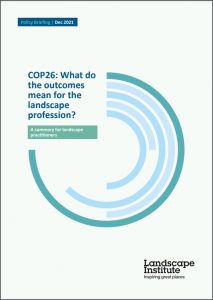At the COP26 Summit in Glasgow in November, world leaders met to determine the scale of ambition and action to limit global warming. A new LI policy briefing covers headline outcomes around the Glasgow Climate Pact, the UK’s Net Zero Strategy, global adaptation goals, and UK climate adaptation policy, with particular focus on implications for the landscape profession.
At the COP26 Summit in Glasgow in November, world leaders met to determine the scale of ambition and action to limit global warming.
The 26th global climate conference was a defining moment for the future of the planet and humankind. It offered the potential for ambitious commitment from all UN nations to limit global warming in the next decade to 1.5°C.
Announcements made both during the two-week conference in November and in the months preceding it finally led to the Glasgow Climate Pact, which built on the Paris Agreement and Kyoto Protocol.
The LI has produced a new policy briefing document covering the UK Government’s goals for the conference, the LI’s key asks of COP26, and headline outcomes around the Glasgow Climate Pact, the UK’s Net Zero Strategy, global adaptation goals, and UK climate adaptation policy, with particular focus on the implications for the landscape profession.
Executive summary
Landscape professionals will find all COP26 climate announcements of interest. The most relevant, however, are those pertaining to nature-based solutions, climate adaptation, and the role of cities and the built environment.
The headline messages for the UK landscape profession are:
- International commitments take a long time to translate into domestic changes. Eventually, top-level commitments on global warming will require the UK Government to change the way we plan and build our cities, with substantial investment in green development and green skills.
- Major winners at COP26 included electric vehicles, global pledges to cut methane emissions by 30%, some progress on adaptation funds for developing countries, and initiatives to stop deforestation.
- The bulk of the relevant announcements for UK decarbonisation were in the
government’s October 2021 Net Zero Strategy. - The most relevant parts of this for the UK landscape sector were local transport decarbonisation (including cycling/walking investment) and land use change in the context of nature-based solutions (for example, afforestation).
- The meaningful announcements on climate adaptation in the UK – including flooding, urban heat, biodiversity, and more – will be summarised in the next five-year National Adaptation Programme for 2023-2028, which will be published in 2022.
- The UK Environment Act 2021 also passed during the second week of COP26. The Act makes provisions for targets, plans and policies that improve the natural environment and contribute to more sustainable places. (See here for a more in-depth policy briefing on the Environment Act 2021.)







